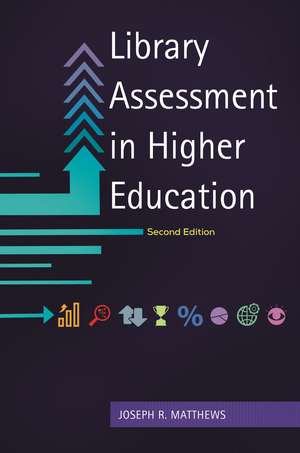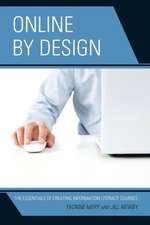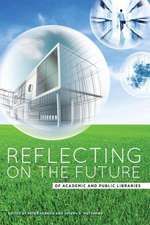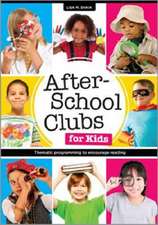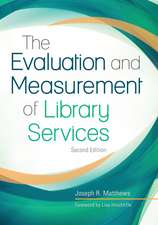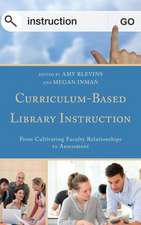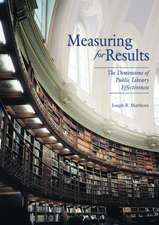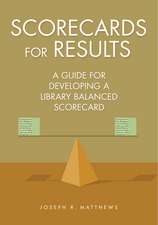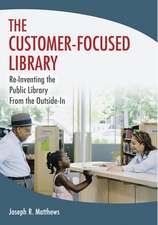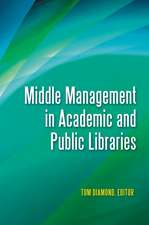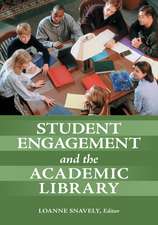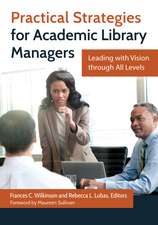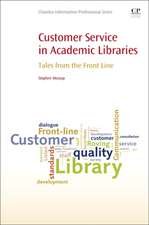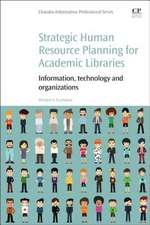Library Assessment in Higher Education
Autor Joseph R. Matthewsen Limba Engleză Paperback – dec 2014 – vârsta până la 17 ani
Preț: 319.39 lei
Preț vechi: 452.16 lei
-29% Nou
Puncte Express: 479
Preț estimativ în valută:
61.12€ • 63.58$ • 50.46£
61.12€ • 63.58$ • 50.46£
Carte tipărită la comandă
Livrare economică 14-28 aprilie
Preluare comenzi: 021 569.72.76
Specificații
ISBN-13: 9781610698177
ISBN-10: 1610698177
Pagini: 240
Dimensiuni: 156 x 235 x 15 mm
Greutate: 0.4 kg
Ediția:Revised
Editura: Bloomsbury Publishing
Colecția Libraries Unlimited
Locul publicării:New York, United States
ISBN-10: 1610698177
Pagini: 240
Dimensiuni: 156 x 235 x 15 mm
Greutate: 0.4 kg
Ediția:Revised
Editura: Bloomsbury Publishing
Colecția Libraries Unlimited
Locul publicării:New York, United States
Caracteristici
Explains why and how specific methods have been useful in determining the library's impact
Notă biografică
Joseph R. Matthews is a consultant who has assisted numerous academic, public, and special libraries in a wide variety of projects.
Cuprins
Contents Acknowledgments Chapter 1: IntroductionChapter 2: Mission of the College or UniversityChapter 3: Model of the Student Educational ProcessChapter 4: Assessment of Student Learning OutcomesChapter 5: Assessment of the Library's Contribution to Student Learning OutcomesChapter 6: Institutional Assessment of Teaching EffectivenessChapter 7: Assessment of the Library's Impact on Teaching EffectivenessChapter 8: Institutional Assessment of the Research EnvironmentChapter 9: Assessment of the Library's Impact on the ResearchChapter 10: Other Areas of the Library's ImpactChapter 11: Planning Assessment Chapter 12: Implementing Assessment Appendix: Outcomes Questions for PractitionersIndex
Recenzii
The book provides any academic librarians with up-to-date and practical information that is valuable for planning and implementing library assessment. It should prove appropriate and a must-have for all assessment librarians in an academic setting. The book will absolutely be a valued addition to any academic library collection. Library Assessment in Higher Education will make a significant contribution to the existing literature on assessment of higher institutions and academic libraries.
The broad perspective format of the book provides a good way to see many of the issues associated with assessment. It is recommended for academic libraries.
[The author] aims the book explicitly at library directors and managers, who will find the blend of theory, application, and data more appealing. Librarians who have the responsibility to manage a library's assessment activities will also find value in the specific guidelines and examples of other academic library assessment plans. . . . Some of Matthews's comments are pithy reminders of important aspects of assessment. For those individuals who become mired in the data,Matthews reminds us that "assessment is a process and not a goal" (p. 205). As such, reading Library Assessment in Higher Education is an excellent part of that process.
The broad perspective format of the book provides a good way to see many of the issues associated with assessment. It is recommended for academic libraries.
[The author] aims the book explicitly at library directors and managers, who will find the blend of theory, application, and data more appealing. Librarians who have the responsibility to manage a library's assessment activities will also find value in the specific guidelines and examples of other academic library assessment plans. . . . Some of Matthews's comments are pithy reminders of important aspects of assessment. For those individuals who become mired in the data,Matthews reminds us that "assessment is a process and not a goal" (p. 205). As such, reading Library Assessment in Higher Education is an excellent part of that process.
